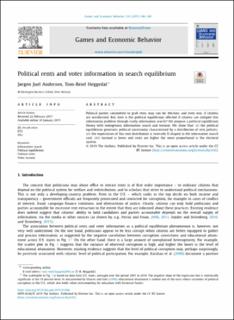| dc.contributor.author | Andersen, Jørgen Juel | |
| dc.contributor.author | Heggedal, Tom-Reiel | |
| dc.date.accessioned | 2020-02-26T14:17:24Z | |
| dc.date.available | 2020-02-26T14:17:24Z | |
| dc.date.created | 2019-03-15T07:55:52Z | |
| dc.date.issued | 2019 | |
| dc.identifier.citation | Games and Economic Behavior. 2019, 114 146-168. | en_US |
| dc.identifier.issn | 0899-8256 | |
| dc.identifier.uri | https://hdl.handle.net/11250/2644032 | |
| dc.description.abstract | Political parties commited to grab rents may run for election, and even win, if citizens are uninformed. But, how is the political equilibrium affected if citizens can mitigate this information problem through costly information search? We propose a political equilibrium theory with endogenous information search and turnout. We show that: (i) the political equilibrium generates political uncertainty characterized by a distribution of rent policies; (ii) the expectation of this rent distribution is inversely U-shaped in the information search cost; (iii) turnout is lower and rents are higher the more proportional is the electoral system. | en_US |
| dc.language.iso | eng | en_US |
| dc.publisher | Elsevier | en_US |
| dc.rights | Navngivelse 4.0 Internasjonal | * |
| dc.rights.uri | http://creativecommons.org/licenses/by/4.0/deed.no | * |
| dc.title | Political Rents and Voter Information in Search Equilibrium | en_US |
| dc.type | Journal article | en_US |
| dc.type | Peer reviewed | en_US |
| dc.description.version | publishedVersion | en_US |
| dc.source.pagenumber | 146-168 | en_US |
| dc.source.volume | 114 | en_US |
| dc.source.journal | Games and Economic Behavior | en_US |
| dc.identifier.doi | 10.1016/j.geb.2019.01.006 | |
| dc.identifier.cristin | 1684952 | |
| cristin.unitcode | 158,3,0,0 | |
| cristin.unitname | Institutt for samfunnsøkonomi | |
| cristin.ispublished | true | |
| cristin.fulltext | postprint | |
| cristin.qualitycode | 2 | |

